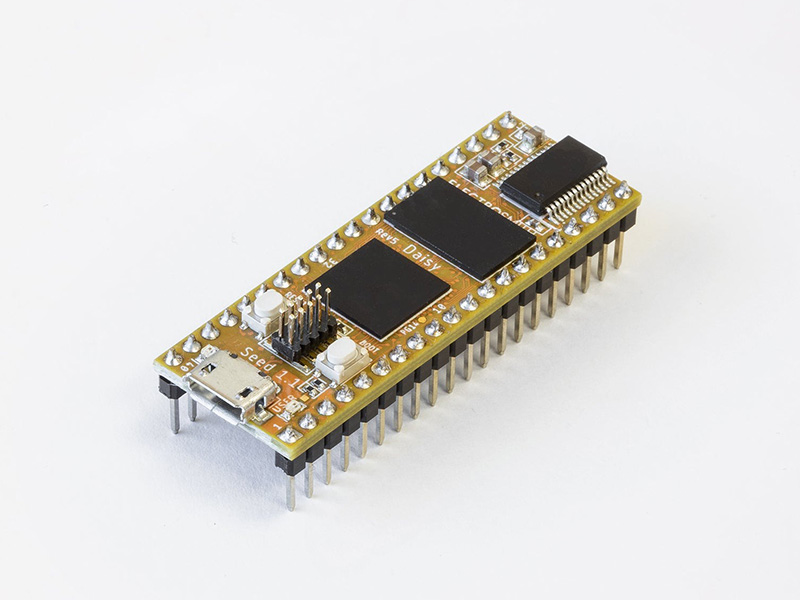
Daisy Seed by Electrosmith
Daisy is an embedded platform for music. It features everything you need for creating high fidelity audio hardware devices. Just plug in a USB cable and start making sound! Programming the Daisy is a breeze with support for a number of languages including C++, Arduino, and Max/MSP Gen~. To get started, simply upload an example program over USB, and start tweaking!
Documentation, design files, and assets are hosted on our Daisy Support Site.
All firmware that we develop is released for free under a permissive open source license.
- Stereo audio IO - 96kHz / 24-bit audio hardware (AC-Coupled)
- Programmable in: C++, Arduino, Max/MSP gen~, Pure Data
- x31 GPIO, x12 ADC inputs (16-bit), x2 DAC outputs (12-bit, DC-Coupled)
- ARM Cortex-M7 MCU, running at 480MHz
- 64MB of SDRAM for up to 10 minute long audio buffers, 8MB external flash
- SD card interface, PWM outputs, and various serial protocols for external devices (SPI, UART, SAI/I2S, I2C)
- Dedicated VIN pin for external power
Purchase
Contribute
Have some info to add for this board? Edit the source for this page here.
CircuitPython 10.0.3
This is the latest stable release of CircuitPython that will work with the Daisy Seed. Use this release if you are new to CircuitPython.
Modules included in this download
_asyncio _bleio _bleio (HCI co-processor) _pixelmap adafruit_bus_device adafruit_pixelbuf aesio array atexit audiocore audiomixer audiomp3 audiopwmio binascii bitbangio bitmapfilter bitmaptools board builtins builtins.pow3 busdisplay busio busio.SPI busio.UART codeop collections digitalio displayio epaperdisplay errno fontio fourwire framebufferio getpass gifio i2cdisplaybus io jpegio json keypad keypad.KeyMatrix keypad.Keys keypad.ShiftRegisterKeys keypad_demux keypad_demux.DemuxKeyMatrix locale lvfontio math microcontroller msgpack onewireio os os.getenv pwmio rainbowio random re rtc sdcardio sdioio select sharpdisplay storage struct supervisor synthio sys terminalio tilepalettemapper time touchio traceback ulab usb_cdc usb_hid usb_midi vectorio warnings zlibFeatures: Breadboard-Friendly, Raspberry Pi Pico Form Factor
CircuitPython 10.1.0-rc.1
This is the latest development release of CircuitPython that will work with the Daisy Seed.
Alpha development releases are early releases. They are unfinished, are likely to have bugs, and the features they provide may change. Beta releases may have some bugs and unfinished features, but should be suitable for many uses. A Release Candidate (rc) release is considered done and will become the next stable release, assuming no further issues are found.
Please try alpha, beta, and rc releases if you are able. Your testing is invaluable: it helps us uncover and find issues quickly.
Modules included in this download
_asyncio _bleio _bleio (HCI co-processor) _pixelmap adafruit_bus_device adafruit_pixelbuf aesio array atexit audiocore audiomixer audiomp3 audiopwmio binascii bitbangio bitmapfilter bitmaptools board builtins builtins.pow3 busdisplay busio busio.SPI busio.UART codeop collections digitalio displayio epaperdisplay errno fontio fourwire framebufferio getpass gifio i2cdisplaybus io jpegio json keypad keypad.KeyMatrix keypad.Keys keypad.ShiftRegisterKeys keypad_demux keypad_demux.DemuxKeyMatrix locale lvfontio math microcontroller msgpack onewireio os os.getenv pwmio rainbowio random re rtc sdcardio sdioio select sharpdisplay storage struct supervisor synthio sys terminalio tilepalettemapper time touchio traceback ulab usb_cdc usb_hid usb_midi vectorio warnings zlibFeatures: Breadboard-Friendly, Raspberry Pi Pico Form Factor
Absolute Newest
Every time we commit new code to CircuitPython we automatically build binaries for each board and language. The binaries are stored on Amazon S3, organized by board, and then by language. These releases are even newer than the development release listed above. Try them if you want the absolute latest and are feeling daring or want to see if a problem has been fixed.
Previous Versions of CircuitPython
All previous releases of CircuitPython are available for download from Amazon S3 through the button below. For very old releases, look in the OLD/ folder for each board. Release notes for each release are available at GitHub button below.
Older releases are useful for testing if you something appears to be broken in a newer release but used to work, or if you have older code that depends on features only available in an older release. Otherwise we recommend using the latest stable release.
